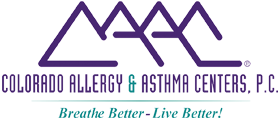As kids across Colorado get ready to head back to school, many parents are focused on supplies, schedules, and new routines. But for families managing allergies, whether it’s pollen, food, or classroom irritants, back-to-school season brings a different kind of checklist.
At Colorado Allergy & Asthma Centers, we work with families year-round to help children feel their best at school. If your child deals with allergies, here’s how to set them up for success this academic year.
Know What Triggers Are Common in Colorado Schools
Environmental Allergies
Fall ragweed, dust mites, mold in older buildings, and changing air quality can all affect your child’s comfort and concentration.
Food Allergies
Even with precautions, accidental exposure can happen in lunchrooms or during class parties.
Asthma & Exercise-Induced Symptoms
Recess, gym class, or changes in weather can trigger coughing, wheezing, or shortness of breath, especially when allergens are present.
Tips to Prepare for a Healthy School Year
1. Schedule a Pre-School Allergy Check-In
Make sure your child’s symptoms are under control before school starts. Your provider can adjust medications, update action plans, and make recommendations specific to school environments.
Bonus tip: Ask your allergist for a written Allergy Action Plan or Asthma Action Plan to share with the school nurse.
2. Meet with the School Nurse and Staff
- Provide a list of known allergies and symptoms.
- Drop off any required medications, like antihistamines, inhalers, or epinephrine injectors.
- Confirm your child’s emergency care plan is on file and understood.
This is especially important for kids with food allergies or asthma, as early intervention during a reaction is key.
3. Teach Your Child to Speak Up
Even young kids can learn to recognize their symptoms and communicate with teachers or staff. Make sure your child knows:
- What foods or situations to avoid
- How to describe how they feel
- When to ask for help or visit the nurse
4. Pack Smart for Allergies
Depending on your child’s age and/or triggers, consider adding the following to their backpack:
- Daily allergy medications (if approved by the school)
- Tissues or wipes
- Emergency meds like EpiPens or rescue inhalers
- A note card with emergency contact info and allergy reminders
5. Stay Updated on Air Quality and Pollen Levels
Colorado’s air can shift quickly in late summer and fall, especially with wildfire smoke or high pollen days. Use tools like Pollen.com or AirNow.gov to monitor outdoor conditions.
On high-pollen days, consider:
- Having your child shower and change clothes after school
- Keeping windows closed in your home
- Using an air purifier in their bedroom
Supporting Your Child Beyond the Classroom
Managing allergies isn’t just about avoiding triggers. It’s about building confidence and support. Encourage your child to speak up, take ownership of their health, and stay consistent with treatment. That way, they can focus on what matters most: learning, growing, and enjoying the school year.
Need Support from a Specialist?
At Colorado Allergy & Asthma Centers, we work with children and families to create custom care plans that keep symptoms under control. From testing and diagnosis to education and treatment, we’re here to help your child thrive.
Schedule an Appointment
Want to make sure your child is ready for the school year? Book an appointment with one of our board-certified specialists today.
Category: Uncategorized


